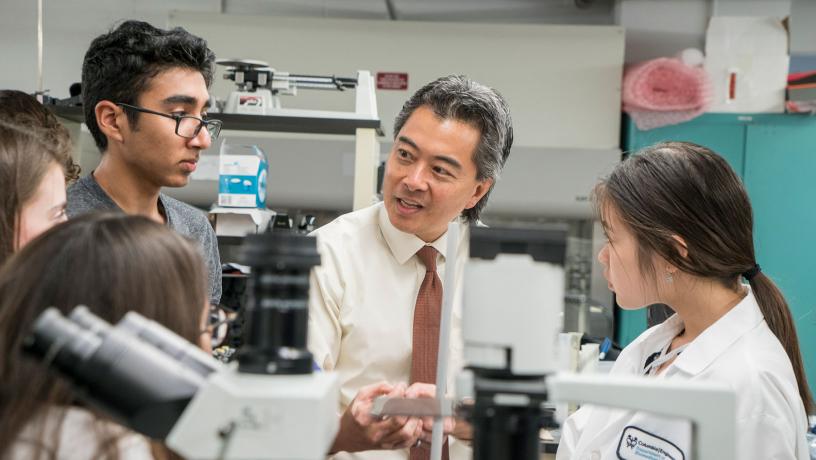Learning from Teaching

SHAPE participants in the lab with Prof. Clark Hung.
When ten Columbia Engineering undergraduates were selected to become instructors and mentors in the school’s annual Summer High School Academic Program for Engineers (SHAPE) earlier this year, they didn’t necessarily expect to learn even more than they’d teach.
“It really was a growth experience for me,” said Miriam Linz ’21, who took part in teaching computer science and an elective in entrepreneurship. “You end up gaining a lot more than you give over the summer.”
Each year, SHAPE draws a growing number of rising high school sophomores, juniors, and seniors from across the New York City area for intensive three-week classes in biomedical engineering, computer science, electrical engineering, robotics. These courses are led by Columbia Engineering faculty and focus on an array of projects in areas like solar energy and tissue engineering with the assistance of undergraduate EEUs (for Education Experience for Undergraduates). The undergraduates themselves lead and participate in a range of electives and workshops on topics from sustainability to college prep. Applications for the next session are now open.
For the program’s third year, Columbia Engineering Outreach focused on enhancing the extensive orientation that kicks off the EEUs’ summer. The undergrads spent a busy week working with veteran educators and experts to learn the ropes of pedagogy, mediation, multicultural fluency, and more. The outreach team utilized training from the Multicultural Affairs Office, Alice! At Columbia Health, and Columbia University Emergency Medical Services (CUEMS). They also leveraged the expertise of their own team members such as Outreach Program Specialist Karen Cheng. A former math teacher with a doctorate degree in STEM Education, Cheng led workshops on lesson planning and classroom management.
“Our goal was to use all available resources on campus that would prepare the EEUs in the classroom; both with professors and in leading their own electives,” said Kayla Quinnies, outreach program manager at Columbia Engineering. “It is very important that the EEUs are comfortable as leaders and mentors. We already know they are excellent students. We want to provide them with teaching experience and the opportunity to succeed in a new role.”
The EEUs agree that the hard work in these training sessions was valuable.
You engage with the material in such an in-depth way when in the position of teaching, you gain such a diverse set of skills that will equip you for future employment.
“I’ve sat in on many training programs before, but I was surprised by all the skills I gained,” Linz said. “We had experienced teachers walk us through how to make a curriculum, mental health professionals teach us how to approach sensitive issues with students, diversity training, and even CPR certification.”
“It was definitely a whirlwind, but it really prepared us to work with students and handle sticky situations in the classroom,” concurred Augustus Devaul ‘22, who was an EEU for the robotics course and co-taught an elective in game theory.
“The best part of the experience was working with the students,” said Amanda Klepper ’22, whose teaching included acting as a robotics EEU and co-teaching an elective in sustainability. “I definitely became a better educator over the course of the program from working with different kinds of students to give them all the best experience possible. I feel much more prepared to teach the many different students I might one day have in a classroom.”
The experience has made the EEUs appreciate their own teachers and mentors all the more, at Columbia and elsewhere, and inspired them to think further about potential careers sharing STEM with the next generation.
“The summer was a great stepping stone for developing valuable soft skills,” said Megan St. Hilaire ’22, who helped teach computer science and the elective in entrepreneurship. SHAPE got her more comfortable speaking in front of groups, she says, as well as more practiced at communicating complex subjects to a diverse range of audiences. “I’ve come to understand that teaching in a way that sticks and is engaging is an art.”
“I would encourage every engineering student to consider becoming an EEU next summer,” Linz said. “You engage with the material in such an in-depth way when in the position of teaching, you gain such a diverse set of skills that will equip you for future employment, and you get to meet such a great group of people. It’s an opportunity to have a real impact on high school students while leaving the summer equally as impacted.”
Support from faculty members is also critical to the success of the program. “We are lucky to have incredible SEAS professors involved in SHAPE,” said Emily Ford, director of outreach programs and special projects. “Their leadership and commitment to quality engineering education makes this program possible. We know great teaching inspires both the high school participants and undergraduate EEUs to explore engineering further.”
